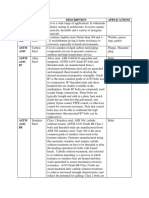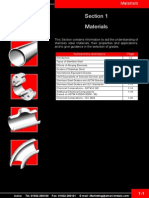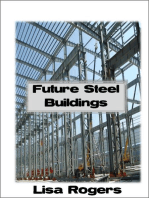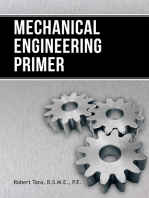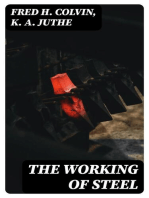Steel Fasteners: Materials - Carbon & Alloy Steels
Steel Fasteners: Materials - Carbon & Alloy Steels
Uploaded by
Negro PretoCopyright:
Available Formats
Steel Fasteners: Materials - Carbon & Alloy Steels
Steel Fasteners: Materials - Carbon & Alloy Steels
Uploaded by
Negro PretoOriginal Description:
Original Title
Copyright
Available Formats
Share this document
Did you find this document useful?
Is this content inappropriate?
Copyright:
Available Formats
Steel Fasteners: Materials - Carbon & Alloy Steels
Steel Fasteners: Materials - Carbon & Alloy Steels
Uploaded by
Negro PretoCopyright:
Available Formats
MATERIALS CARBON & ALLOY STEELS
P R O F E S S I O N A L S S E R V I N G P R O F E S S I O N A L S 7
T
E
C
H
N
I
C
A
L
7
STEEL FASTENERS
CARBON STEEL FASTENERS
Approximately 90 percent of all fasteners are manufactured
from carbon steel. Steel has excellent workability, a broad
range of strength properties, and the raw material is quite
inexpensive. There are over 100 different standard strength
grades for steel fasteners, each with its own set of properties
and designations.
In general, carbon steel fastener strength grades can be
placed into three broad groupings involving low carbon,
medium carbon, and alloy steel, The most widely referenced
strength grade for carbon steel external threaded fasteners is
detailed in the SAE J429 standard. The system is comprised
of bolt grades made from low carbon steel through to alloy
steels.
The common grades of the SAE system are repeated and
expanded upon in separate ASTM standards, notably A307,
A449, A325 and A490.
LOW CARBON STEELS (Used for GR2 bolts)
Low carbon steels, as used for fasteners, are defined as
those with insufficient carbon content to permit a predictable
response to a strengthening heat treatment process. The
most commonly used analysis are AISI 1006, 1008, 1016,
1018, 1021 and 1022. These steels have good workability,
they can be case hardened, and are weldable.
Note: (Piping Bolt) The low carbon steel fastener ASTM A307
is a special bolt used in piping and flange work. It has
properties similar to other low carbon steel bolts except that it
has the added requirement of a specified maximum tensile
strength. The reason for this is to ensure that the bolt will
fracture, before breaking a cast iron flange on a pump or
valve, if the bolt is inadvertently over-tightened.
MEDIUM CARBON STEELS (Used for GR5 bolts)
Medium carbon steels are heat treatable, which means that
through metallurgical treatments the tensile strength of the
fastener after processing can be significantly higher than that
of its original raw material. Popular analysis are AISI 1030,
1035, 1038 and 1541. On a strength-to-cost basis, medium
carbon heat treated steel fasteners provide more load carrying
capability per unit of cost than any other known metal. Their
yield-to-tensile ratio is the lowest of all heat treated steels
which gives them superior ductility. In fact, they are
frequently referred to as forgiving which means they have a
punching bag ability to absorb punishment and service abuse.
ALLOY STEELS (Used for GR8 bolts)
Carbon steel is classed as an alloy steel when the maximum
of the range of content specified for manganese is greater
than 1.65 percent, or for silicon 0.60 percent, or for copper
0.60 percent, or when the chromium content is less than 4.0
percent (if greater it approaches being a stainless steel), or
when the steel contains a specified minimum content of
aluminum, boron, cobalt, columbium, molybdenum, nickel,
titanium, vanadium, zirconium, or any other element added to
achieve a specific effect.
ALLOY STEEL STUD BOLTING MATERIALS
The following grades of heat treated alloy steel studs are
commonly used for high-pressure or extreme service in
diameters of 1/4 inch to 4 inches, inclusive. Other grades and
other diameters are available on special order.
ASTM A193, Grade B7
A heat treated chromium-molybdenum steel widely used for
medium high temperature service. (Liquid quench -50 to
900F, Air quench -40to 900F)
ASTM A193, Grade B7M
Similar to B7 studs except that the minimum yield and tensile
strength requirements are reduced and the hardness
controlled to 235 Brinell maximum. Designed for use in
corrosive environments. (-50to 900F.)
ASTM A193, Grade B16
A heat treated chromium-molybdenum, vanadium steel for
high pressure, high temperature service. (-50to 1100F.)
ASTM A320, Grade L7
This grade is intended for low temperature service down to
minus 150F and has a minimum Charpy impact value of 20
ft lb at this temperature. (-150to 1100F.)
ASTM A320, Grade L7M
Similar to L7 studs except that the minimum yield and tensile
strength requirements are reduced and the
hardness controlled to 235 Brinell maximum. This stud
is designed for use in low temperature corrosive environ-
ments. (-150to 1100F.)
ASTM A193, Grade B8
These Chromium-Nickel (AISI 304) austenitic steel studs are
used in corrosive environments. (-325to 1500F.)
ASTM A193, Grade B8M
These Chromium-Nickel Molybdenum (AISI 316) austenitic
steel studs are used in corrosive environments. (-325
to 1500F.)
CARBON AND ALLOY STEEL NUTS
ASTM A194, Latest Revision, Grade 2H
Suitable for use in high temperatures and high pressure
conditions.
ASTM A194, Grade 2HM
Similar to 2H nuts except this grade is designed for use in
corrosive environments.
ASTM A194, Latest Revision, Grade 4
Heat treated molybdenum steel nuts suitable for severe
temperature and pressure conditions.
ASTM A194, Latest Revision, Grade L7
New stamping as per ASTM is 7L. Heat treated chrome-
molybdenum steel nuts suitable for extreme temperature and
pressure conditions. Suitable for sub-zero service conditions
and have minimum Charpy impact values of ASTM spec.
A320. Grade 7 down to -150F.
ASTM A194, Grade L7M
New stamping as per ASTMis 7ML. Similar to grade L7 nuts
except this grade is designed for use in corrosive environments.
ASTM A194, Grade 8/8M
Stainless steel nuts designed for use in corrosive
environments.
01_BSH-Tech-1-30 1/9/03 7:41 PM Page 7
You might also like
- Astm Bolt & NutsDocument24 pagesAstm Bolt & NutsDinesh Radhakrishnan100% (3)
- ASTM A333 Grade 6 SpecificationDocument9 pagesASTM A333 Grade 6 SpecificationmaldonadohansNo ratings yet
- General Purpose Steel Grade ChartDocument2 pagesGeneral Purpose Steel Grade ChartDavid D'Agostino50% (2)
- ASTM A213 T2 ASME SA213 T2 SpecificationDocument6 pagesASTM A213 T2 ASME SA213 T2 SpecificationhamiraziNo ratings yet
- Tubing ComparisonsDocument2 pagesTubing ComparisonsBrummerNo ratings yet
- Dimensions, Weights and Properties of Special and Standard Structural Steel Shapes Manufactured by Bethlehem Steel CompanyFrom EverandDimensions, Weights and Properties of Special and Standard Structural Steel Shapes Manufactured by Bethlehem Steel CompanyNo ratings yet
- 4.ASTM A193 B7 Vs A320 L7 Stud BoltsDocument4 pages4.ASTM A193 B7 Vs A320 L7 Stud BoltsO'zSamaNo ratings yet
- Datasheet For Carbon Steel A333 Grade 6Document10 pagesDatasheet For Carbon Steel A333 Grade 6Aneesh JoseNo ratings yet
- Astm Material Summary For BoltsDocument6 pagesAstm Material Summary For Boltsangelufc99No ratings yet
- What Are Astm A286 and ASTM A193 B7 BoltsDocument2 pagesWhat Are Astm A286 and ASTM A193 B7 BoltsJignesh SteelNo ratings yet
- Guide To Selection: Hot Rolled Carbon Steel BarsDocument4 pagesGuide To Selection: Hot Rolled Carbon Steel BarsJess OrtonNo ratings yet
- Steel Grades Eg WCBDocument4 pagesSteel Grades Eg WCBsantosh shevaleNo ratings yet
- Alloy Steel Round BarDocument10 pagesAlloy Steel Round BarSingarao KattaNo ratings yet
- What Are The Available Material Grades?Document3 pagesWhat Are The Available Material Grades?elakiyaNo ratings yet
- Metal Material DescriptionDocument3 pagesMetal Material DescriptionNelbert SumalpongNo ratings yet
- Astm Material Summary For BoltsDocument2 pagesAstm Material Summary For BoltsAkshay PoddarNo ratings yet
- Boiler Tube GradesDocument12 pagesBoiler Tube Gradesfelram100% (1)
- Standard Steel PlatesDocument39 pagesStandard Steel PlatesCuong TranHung100% (1)
- Low Alloy Steels For Cryogenic ApplicationsDocument0 pagesLow Alloy Steels For Cryogenic ApplicationsidienNo ratings yet
- Piping Material - GuidanceDocument17 pagesPiping Material - GuidanceAlfon50% (2)
- Generally The Materials Used For Structures Fall Into The Category of A Welded Steel Structure With Castings As Reinforcement in Critical AreasDocument4 pagesGenerally The Materials Used For Structures Fall Into The Category of A Welded Steel Structure With Castings As Reinforcement in Critical AreasbalajimetturNo ratings yet
- Materials Stud Bolts: ASTM A197 B7Document5 pagesMaterials Stud Bolts: ASTM A197 B7scribddisantoNo ratings yet
- AL201LNDocument6 pagesAL201LNCastoriadisNo ratings yet
- ASTM A213 T22 ASME SA213 T22 Specification - 3 PDFDocument6 pagesASTM A213 T22 ASME SA213 T22 Specification - 3 PDFbagus asmoroNo ratings yet
- Electric-Resistance-Welded Carbon and Alloy Steel Mechanical TubingDocument20 pagesElectric-Resistance-Welded Carbon and Alloy Steel Mechanical TubingLucio Alejandro AlejandroNo ratings yet
- AISI SteelsDocument5 pagesAISI Steelsanirudh_indana100% (1)
- Specification of A193Document2 pagesSpecification of A193Bambang RewanggiNo ratings yet
- Material of Construction in ASME Code Pressure VesselsDocument7 pagesMaterial of Construction in ASME Code Pressure VesselsFaisal AwadNo ratings yet
- Comparing Steel Plate Grades Ebook PDFDocument5 pagesComparing Steel Plate Grades Ebook PDFJayaseelan GNo ratings yet
- Boiler MaterialsDocument5 pagesBoiler MaterialsRavi ShankarNo ratings yet
- Bolts GradesDocument9 pagesBolts GradesMachineryengNo ratings yet
- F568MDocument9 pagesF568Maldert_pathNo ratings yet
- MCM AllDocument7 pagesMCM AllPalanisamy RajaNo ratings yet
- JIS Standards Conv2Document26 pagesJIS Standards Conv2johnnyquest_86No ratings yet
- Steel Guide To SelectionDocument7 pagesSteel Guide To Selectionsinetron88No ratings yet
- Stainless Steel Pipe SpecificationDocument3 pagesStainless Steel Pipe Specification1trungson1No ratings yet
- What Is Hsla SteelDocument4 pagesWhat Is Hsla SteelahmedNo ratings yet
- Astm A312-A312m-05Document11 pagesAstm A312-A312m-05NadhiraNo ratings yet
- Astm GradesDocument3 pagesAstm GradeszackjipangNo ratings yet
- ASTM A312 A312M Standard Specification For Seamless Welded and Heavily Cold Worked Austenitic Stainless Steel PipesDocument12 pagesASTM A312 A312M Standard Specification For Seamless Welded and Heavily Cold Worked Austenitic Stainless Steel Pipesessai expertiseNo ratings yet
- Stainless Steel FastenersDocument3 pagesStainless Steel FastenersStainless Steel FastenersNo ratings yet
- FastenerDocument46 pagesFastenerTechproNo ratings yet
- Carbon&Low-Alloy Steel Sheet and StripDocument5 pagesCarbon&Low-Alloy Steel Sheet and Stripducthien_80No ratings yet
- Astm StandardDocument18 pagesAstm Standardharish_mit646361100% (1)
- Stud Bolt Specification 3Document7 pagesStud Bolt Specification 3santoshblonkarNo ratings yet
- Stainless Steel Pipe SpecificationDocument3 pagesStainless Steel Pipe SpecificationBhairu BaniNo ratings yet
- United States Steel Corporation - Application Considerations - Steel Designations - 2016-06-23Document5 pagesUnited States Steel Corporation - Application Considerations - Steel Designations - 2016-06-23Humberto GalvezNo ratings yet
- Aalco MaterialsDocument20 pagesAalco MaterialsMohamed FaragNo ratings yet
- A568.12591-1 Standard Specification For Steel Sheet Carbon Structural and High-Strength Low-Alloy Hot-Rolled and Cold-Rolled Gen ReqmtsDocument28 pagesA568.12591-1 Standard Specification For Steel Sheet Carbon Structural and High-Strength Low-Alloy Hot-Rolled and Cold-Rolled Gen Reqmtshjin25No ratings yet
- Astm A513 A513m 18Document10 pagesAstm A513 A513m 18Thị Hồng Vỹ LêNo ratings yet
- Designation of The Types of SteelsDocument6 pagesDesignation of The Types of SteelsDavid FernandezNo ratings yet
- Steel PipesDocument2 pagesSteel PipesArfanAliNo ratings yet
- Pipe Fittings STDDocument4 pagesPipe Fittings STDimrancenakkNo ratings yet
- Duplex Stainless SteelDocument24 pagesDuplex Stainless SteeljeffreymacaseroNo ratings yet
- The Working of Steel: Annealing, Heat Treating and Hardening of Carbon and Alloy SteelFrom EverandThe Working of Steel: Annealing, Heat Treating and Hardening of Carbon and Alloy SteelNo ratings yet
- Oxy-Acetylene Welding and Cutting: Electric, Forge and Thermit Welding together with related methods and materials used in metal working and the oxygen process for removal of carbonFrom EverandOxy-Acetylene Welding and Cutting: Electric, Forge and Thermit Welding together with related methods and materials used in metal working and the oxygen process for removal of carbonNo ratings yet














